The 12 Best Plants To Grow In Your Living Room
Here are the best houseplants to cozy up your living room.
It’s amazing how much better any room looks (and feels!) with greenery. Like kitchen plants and bedroom plants, adding plants to your living room décor can refresh and update a space. Even one or two small tabletop plants or a large plant in the corner can make your living room feel more cozy and welcoming in an instant.
But before you go plant shopping, look around and determine what kind of light your room gets. Many houseplants prefer bright, indirect light. Most also don’t like to be in direct sunlight because they’ll get sunburned. For west or south-facing windows, use a sheer curtain to shield your plant from direct afternoon sun, especially in summer. If you have a dark room, invest in an LED grow light.
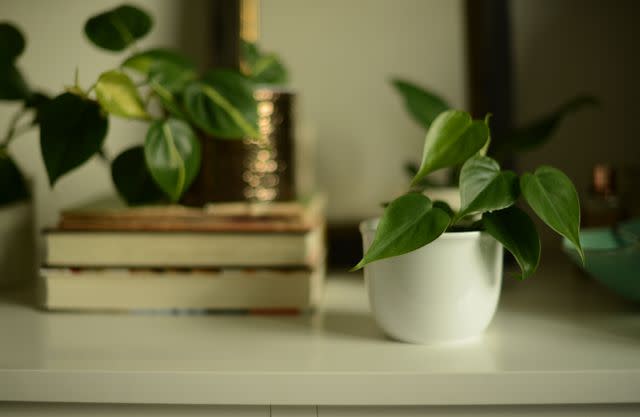
Getty Images / Kristina Strasunske
If you’re a new plant parent, be careful not to overwater. Most houseplants prefer to dry out a little in between waterings. To tell if your plant is ready for a drink, poke your finger into the soil. If soil sticks to it, your plant doesn’t need watered yet. Wait another day and try again. In general, plants do better staying on the too-dry side than on the too-wet side.
Ahead, our favorite houseplants for your living room:
Snake Plant
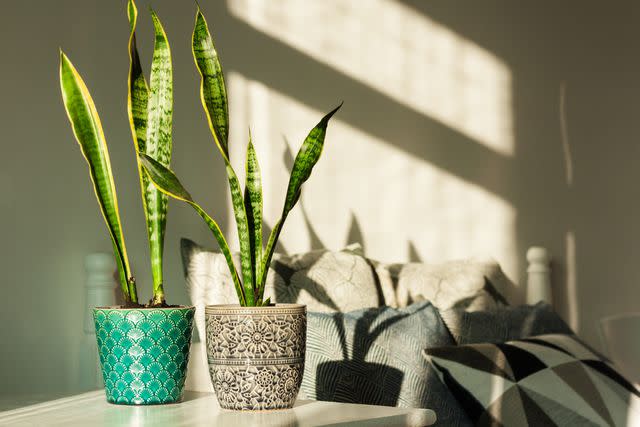
Getty Images / Inna Luzan
Botanical name: Dracaena trifasciata, previously Sansevieria trifasciata
Light: Low to moderate light
Water: Water every few weeks when top few inches of soil feels dry
Snake plant is a great choice for low-light living rooms. It hardly ever needs watered, and it is available in many unique varieties including leaves that are flat and sword-like and those with a more cylindrical spike-like appearance.
Golden Pothos
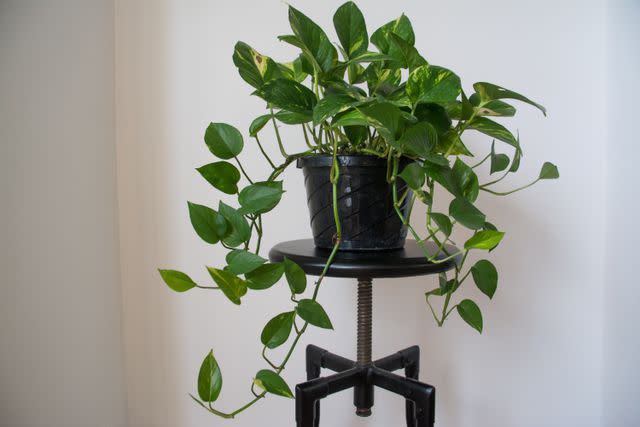
Getty Images / Robi_J
Botanical name: Epipremnum aureum
Light: Medium to bright, indirect light but can adapt to low light levels
Water: Water when top inch or two of soil feels dry; does not tolerate soggy soils
This common pothos is super-easy to grow, especially because it’s tolerant if you’re forgetful about watering. It also tolerates a range of light levels, so it can adapt to low-light spaces. Its glossy leaves and vining form are pretty draping over the edges of end tables and bookshelves.
Bird of Paradise
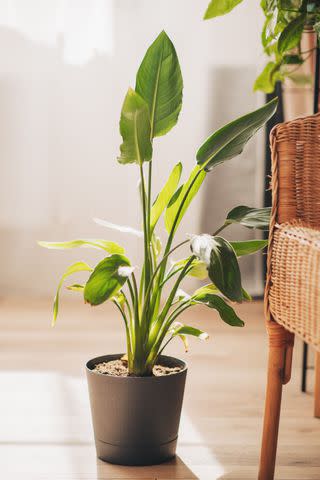
Getty Images / Kseniya Ovchinnikova
Botanical name: Strelitzia
Light: Bright, indirect
Water: Water when soil is mostly dry
You may know this as a landscape plant that grows in USDA zones 10 and warmer. But it’s actually a handsome indoor plant that offers drama with its huge leaves and bold size; it can reach 10 feet tall indoors. Outdoors, it has white or orange flowers that resemble tropical birds, but it rarely blooms indoors.
Rubber Tree
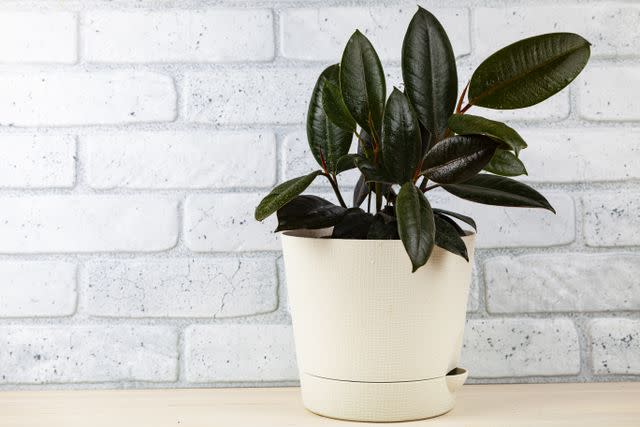
Getty Images /
Botanical name: Ficus elastica
Light: Moderate to bright indirect light
Water: Water when soil is mostly dry, every one to two weeks
With green, bronze, or variegated leaves, the glossy foliage of rubber tree looks good in any room. It can get leggy in time, so rotate it every few weeks for more even growth and prune lightly to maintain its shape (wear gardening gloves to keep the sap off your fingers).
Aglaonema
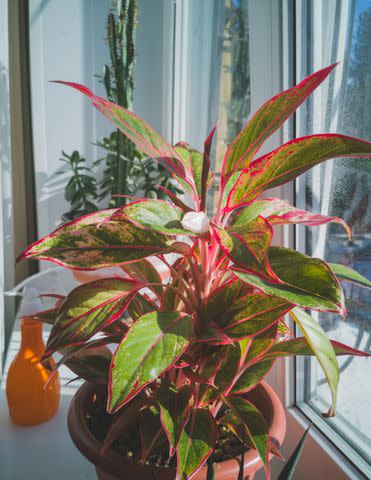
Getty Images
Botanical name: Aglaonema spp.
Light: Low, medium, or bright indirect light
Water: Water when top few inches of soil feels dry; tolerates weeks without watering
Aglaonema is an outstanding plant for adding color without a lot of fuss. It has attractive, long, flat leaves with silvery streaks or pink swaths, which add color to dark corners of your living room. It’s very forgiving if you forget to water.
Dragon Tree
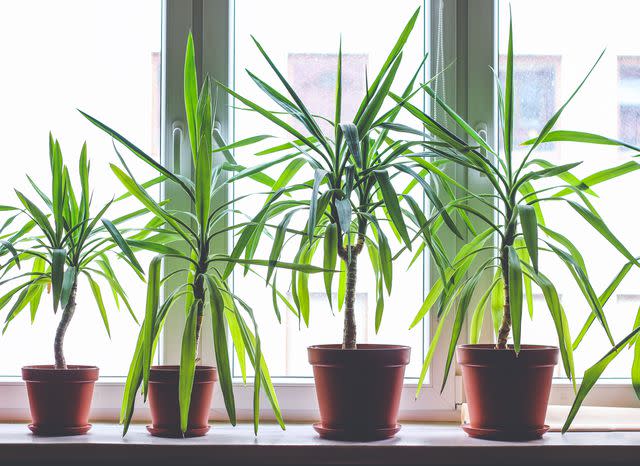
Getty Images / janzwolinski
Botanical name: Dracaena marginata
Light: Bright, indirect light
Water: Water when the first few inches of soil feels dry
With long, strappy red and green variegated leaves atop a trunk or braided stem, this plant adds style to any living room. It’s a low-maintenance plant with a unique silhouette that works well in corners.
Philodendron ‘Brasil’

Getty Images / Kristina Strasunske
Botanical name: Philodendron hederaceum ‘Brasil’
Light: Bright indirect light but will tolerate low light
Water: Water when the first few inches of soil feels dry
This variegated form of heartleaf philodendron is easy to grow. It has dark green leaves with pretty chartreuse centers and looks amazing dangling over the edges of a shelf or end table.
Fittonia
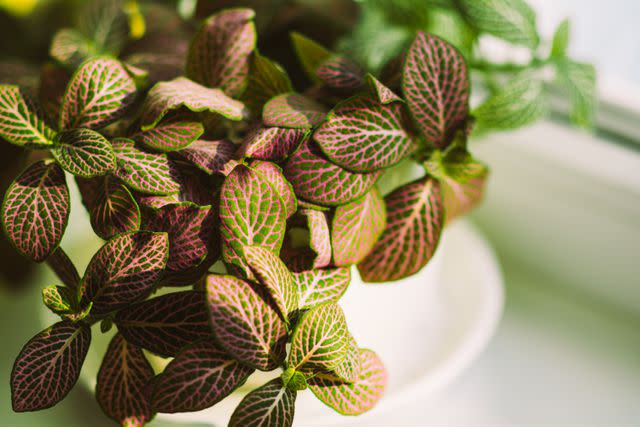
Getty Images / Anastasia Babkina
Botanical name: Fittonia spp.
Light: Bright, indirect light
Water: Keep this plant slightly moist; will wilt if it dries out
Oval leaves with prominent veins of white, red, pink or green make this a colorful addition to the coffee table. Fittonia stays petite, reaching just six inches tall and spreading about a foot wide, so it’s ideal for small spaces. Because it prefers light, consistent moisture, it’s a good choice for terrariums.
Philodendron ‘Moonlight’
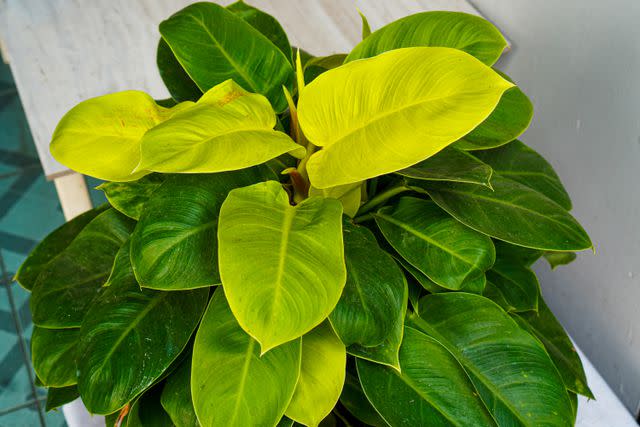
Getty Images
Botanical name: Philodendron ‘Moonlight’
Light: Bright, indirect light
Water: Water when top inch or two of soil feels dry
This philodendron has gorgeous new growth that starts out lemon-lime color before turning dark green. It doesn’t climb or trail but instead has more of a clumping form. It’s a fast grower in bright light.
Peperomia
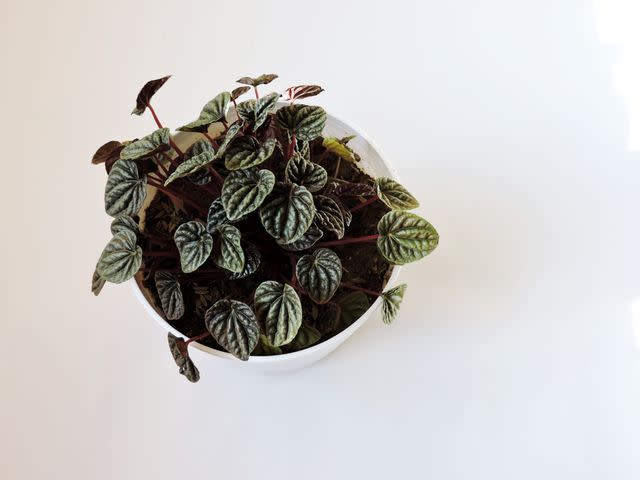
Getty Images / Windah Sri
Botanical name: Peperomia spp.
Light: Bright, indirect light
Water: Water when the soil feels mostly dry
Peperomia comes in many varieties with puckered, heart-shaped, or textured leaves. They all look very different from each other, but they’re also all easy-care plants that prefer to stay on the dry side. They’re slow growers so they stay small at 6 to 12 inches tall and wide and fit nicely on a living room end table.
Monstera Deliciosa
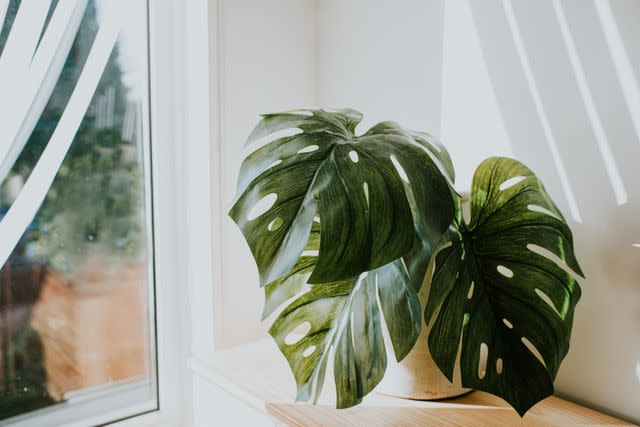
Getty Images / Catherine Falls Commercial
Botanical name: Monstera deliciosa
Light: Bright, indirect light
Water: Water when top inch or two of soil feels dry
This popular houseplant has personality plus! It’s also called Swiss cheese plant, although a few different types of Monstera go by this name. Its long-lobed leaves develop elongated holes, or fenestrations, as the plant matures. It’s a fast grower when it receives ample light.
Norfolk Island Pine
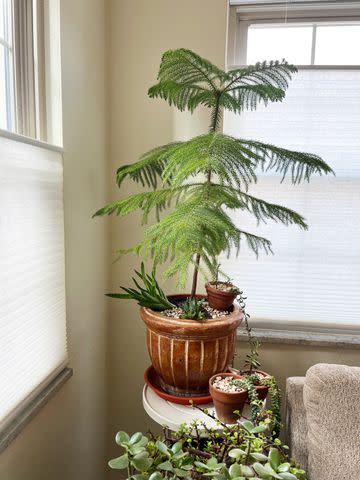
Getty Images / bgwalker
Botanical name: Araucaria heterophylla
Light: Bright, indirect light
Water: Keep soil slightly moist
Norfolk Island pines has soft needles and live a long time if you give them bright light. Rotate the pot regularly so that it grows more evenly. If the light is too dim, your tree will drop its lower branches, which will not regrow.
For more Southern Living news, make sure to sign up for our newsletter!
Read the original article on Southern Living.

